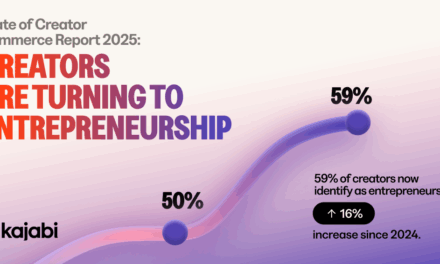Creators tell us their tops – channels, monetization streams, and challenges – in this view of The Tilt’s 2022 Content Entrepreneur Benchmark Research released this week. (Want the highlights of who they are, how much they earn, etc.? Check out my earlier article about our creator economy research.)
Top channels used by content creators
To no surprise, 77% of all creators cite social media as a top channel to reach their audiences. It was by far the most frequently picked choice. I get it. Social media covers many already-built platforms with big audiences. It also has minimal barriers to entry.
But I was pleased to see so many creators take advantage of owned channels – 61% use email newsletters and 60% blog on their own websites. That’s key to building a long-term sustainable content business.
Between one-fourth and one-third of creators use educational channels – online events (30%), teaching (27%), and in-person events (26%). Podcasting and blogger/columnist for others are each used by 26%.
Only 16% use paid promotion channels. Given how many use social media, it’s interesting to see that number so low. In today’s social media environment, if you don’t pay to promote your content, particularly if you’re starting out, it’s unlikely that your content will get found on those channels.
Top challenges faced by part- and full-time creators
Perhaps that low percentage using paid promotion channels might explain why “making sure my content gets found” is the top challenge for both part- and full-time content creators. Fifty-four percent of full-time and 60% of part-time creators say it’s a problem.
Monetizing content also was a challenge for about half of each group – 47% for full-time creators and 51% for part-time creators.
But full- and part-time creators face other challenges to different degrees. The biggest challenge differences were regularly publishing (52% for part-time vs. 36% for full-time), creating enough content (42% vs. 36%), and finding my niche/audience (40% vs. 27%).
All of that makes sense, but the one that concerns me the most is those who have trouble finding their audience. Perhaps that’s because their content tilt isn’t clearly defined. It’s harder to find an audience if you don’t know exactly who you’re targeting. If that’s your challenge, spend most of your time doing online research, one-on-one interviews, focus groups, etc., until you figure out who your audience is.
Top monetization channels of creators
Consulting/coaching was the most frequently cited revenue stream with 62% of creators. Online courses and workshops (39%) and books (27%) rounded out the top three monetization channels.
Affiliate marketing and links were used by 23% and one in five (21%) earn speaking fees. Memberships (17%), advertising (15%), live events (15%), sponsored content (14%), online events (14%), and paid subscriptions (11%) all made the double-digit list.
Interestingly, one in 10 barter with others. Opportunities to trade services, promotion, etc., can be a great way to build your business in the beginning.
Web3 lets content businesses be less risky ventures
Social tokens and NFTs are barely a blip on the monetization channel chart, but they weren’t the only Web3-related discoveries in the 2022 creator economy research.
We started at the beginning – asking creators if they knew the term. Over half of creators don’t know or couldn’t explain what Web3 means. Frankly, knowing the definition isn’t all that important. What is important to today’s content entrepreneurs is knowing how to benefit from a Web3 world.
Web3 is the opportunity for creators to take back control of their audiences, forgoing their reliance on Big Tech (a concern for 75% of those surveyed. Many (88%) own the website for their content business and 24% use a link-tree-type site that they control. About one-fourth (23%) operate a membership-based community – with 75% of those monetizing it.
Want to hear what the creators had to say and dig into the research? Download the free 2022 Content Entrepreneur Benchmark Research today.
About the author
Joe Pulizzi is founder of multiple startups including content creator education site, The Tilt and is the bestselling author of seven books including Content Inc. and Epic Content Marketing, which was named a “Must-Read Business Book” by Fortune Magazine. Joe is best known for his work in content marketing, first using the term in 2001, then launching Content Marketing Institute and the Content Marketing World event. He has two weekly podcasts, the motivational Content Inc. podcast and the content news and analysis show This Old Marketing with Robert Rose. His foundation, The Orange Effect, delivers speech therapy and technology services to over 200 children in 34 states.










